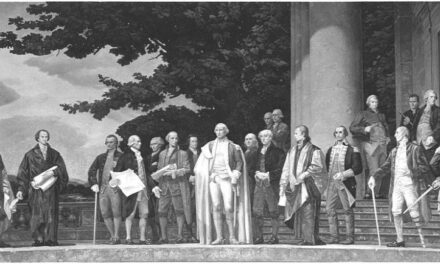We support our Publishers and Content Creators. You can view this story on their website by CLICKING HERE.
To every man upon this earth/ Death cometh soon or late./ And how can man die better/ Than facing fearful odds,/ For the ashes of his fathers,/ And the temples of his gods. —Thomas Babington Macaulay
How much resistance is a man—and a country—obligated to muster against insurmountable odds? This is the central question of the 2015 Danish film, 9.April, which depicts the invasion of Denmark by the Nazis in the spring of 1940. Based on official reports and eyewitness testimony, including that of several survivors of the Danish armed forces who participated in the one-day war (some of whom are interviewed at the end of the film), viewers follow the story of a bicycle infantry company charged with offering the initial resistance to the Nazi advance.
Directed by Roni Ezra, with a screenplay by Tobias Lindholm, the film is permeated by a somber and ominous tone, which is reinforced by the excellent, brooding soundtrack composed by Jonas Struck. As is made clear at the outset of the film, the Danes are hopelessly out-equipped and outmanned. The small bicycle unit possesses nothing more powerful than a “light machine gun” to fend off German armored vehicles and tanks. The question is not whether the Danes will lose, but how long they will fight, and what will happen to the men of the bicycle company.
 The soldiers go about their duties with a grim determination, fear and hopelessness lurking beneath the surface. The film lacks the sort of scenes showing extraordinary acts of bravery that we might expect in a war film about a country’s resistance to Nazi aggression. The heroism depicted is instead of the quiet kind, personified by the effective command of the bicycle unit’s junior officer, Second Lieutenant Sand (played brilliantly by Danish actor Pilou Asbæk). Sand is the central protagonist of the film, and a sense of duty guides him throughout. He knows when to be strict, when to be gentle, when to encourage. The film shows that the Second Lieutenant is perhaps as scared and as despondent as his men, but, being a natural leader, he knows to bury these emotions. This is most apparent in a scene in which German planes fly overhead, and Sand turns his back to his men as he gazes up at the invading Luftwaffe, a look of resignation on his face.
The soldiers go about their duties with a grim determination, fear and hopelessness lurking beneath the surface. The film lacks the sort of scenes showing extraordinary acts of bravery that we might expect in a war film about a country’s resistance to Nazi aggression. The heroism depicted is instead of the quiet kind, personified by the effective command of the bicycle unit’s junior officer, Second Lieutenant Sand (played brilliantly by Danish actor Pilou Asbæk). Sand is the central protagonist of the film, and a sense of duty guides him throughout. He knows when to be strict, when to be gentle, when to encourage. The film shows that the Second Lieutenant is perhaps as scared and as despondent as his men, but, being a natural leader, he knows to bury these emotions. This is most apparent in a scene in which German planes fly overhead, and Sand turns his back to his men as he gazes up at the invading Luftwaffe, a look of resignation on his face.
 Of course, the Danes are waging war for the purest of purposes: the defense of their homeland. They are fighting for “God, King, and Country,” as a colonel reminds Sand. “The enemy has breached the border,” another colonel announces. “Denmark is at war. Gentlemen. Now is the time to show what we’re made of.” Here we have beautifully old-fashioned ideas out of vogue in today’s Woke world: the idea that one’s country’s borders are worth fighting for, no matter the odds; that this kind of war makes for a holy cause; and that physical danger is what reveals the true character of men. In a key scene, when Sand and his men take up a position inside a Danish home to await the arrival of the Germans, the home’s owner, an old woman, makes an offer to the soldiers:
Of course, the Danes are waging war for the purest of purposes: the defense of their homeland. They are fighting for “God, King, and Country,” as a colonel reminds Sand. “The enemy has breached the border,” another colonel announces. “Denmark is at war. Gentlemen. Now is the time to show what we’re made of.” Here we have beautifully old-fashioned ideas out of vogue in today’s Woke world: the idea that one’s country’s borders are worth fighting for, no matter the odds; that this kind of war makes for a holy cause; and that physical danger is what reveals the true character of men. In a key scene, when Sand and his men take up a position inside a Danish home to await the arrival of the Germans, the home’s owner, an old woman, makes an offer to the soldiers:
Old Woman: “You can hide in the hayloft. No one will find you there.”
Sand: “To what good? We are at war.”
Old Woman: “It would save the young men’s lives.”
Sand: “I will do my best to protect them. But I won’t hide them while the war rages. They don’t want that either.”
Old Woman: “Twenty years ago, this was Germany. Now it’s Denmark. Shame on me you may say, but it’s never meant a whole lot to me.”
Sand: “It means a lot to me.”
I will not give away the end of the film here. Suffice it to say that the central question posed at the beginning of this review, and at the heart of the film, is of necessity answered. Viewers will be left to ponder the rightness and morality of Second Lieutenant Sand’s decision.
As of this writing, 9.April is available to view free of charge on Amazon Prime.
The Imaginative Conservative applies the principle of appreciation to the discussion of culture and politics—we approach dialogue with magnanimity rather than with mere civility. Will you help us remain a refreshing oasis in the increasingly contentious arena of modern discourse? Please consider donating now.
Images courtesy of IMDb.
Share This Story, Choose Your Platform!
Go to Top

 Conservative
Conservative  Search
Search Trending
Trending Current News
Current News 






